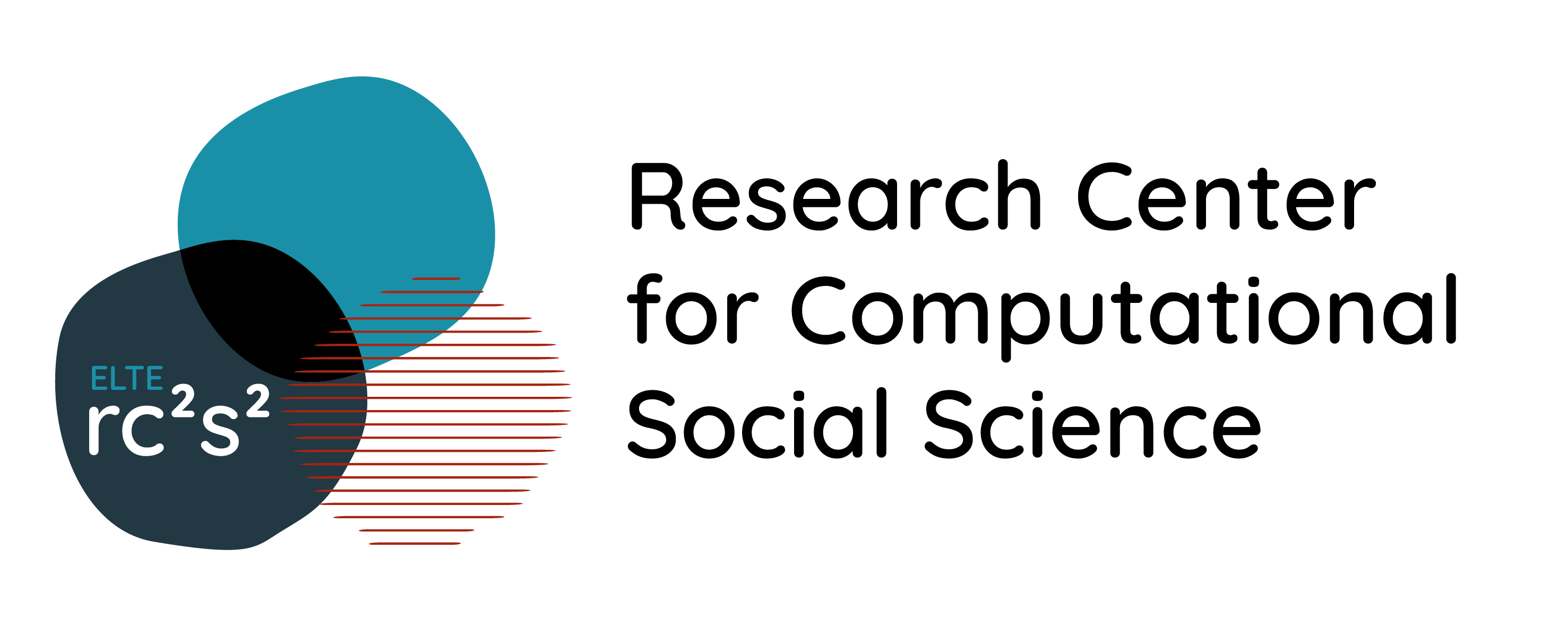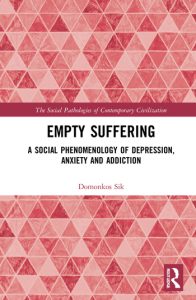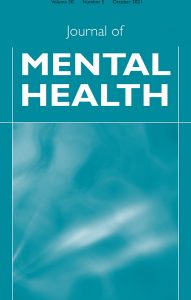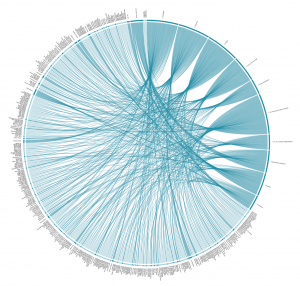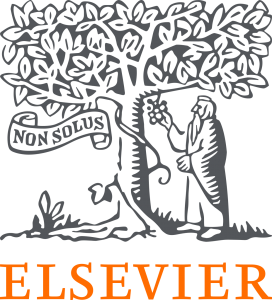Németh, Renáta; Máté, Fanni; Katona, Eszter; Rakovics, Márton; Sik, Domonkos (2022): Bio, psycho, or social: supervised machine learning to classify discursive framing of depression in online health communities.
2022.01.08. Publication Discursive framing of depression in online health communitiesRenáta Németh, Fanni Máté, Eszter Katona, Márton Rakovics and Domonkos Sik published their results in the journal Quality and Quantity: International Journal of Methodology with the following title: ” Bio, psycho, or social: supervised machine learning to classify discursive framing of depression in online health communities “.
Árpád Knap, Diána Bartha, Ildikó Barna (2021): Analysing The Memory Politics Of Trianon And The Holocaust Using Natural Language Processing
2022.01.04. Publication The layers of political public sphere in Hungary (2001–2020)A new publication by members of our research team (Árpád Knap, Diána Bartha, Ildikó Barna) on the memory politics of Trianon and the Holocaust using NLP. Within the “European Memory Politics – Populism, Nationalism and the Challenges to a European Memory Culture (EuMePo)” international research network supported by Jean Monnet Network Grant. English abstract is also available on the link, and an English-language paper on this research is also in press.
Eszter Katona, Domonkos Sik, Renáta Németh (2021): Automated text analysis of topics represented on depression forums using the biopsychosocial model of depression
2021.12.14. Publication Discursive framing of depression in online health communitiesThe Journal Egészségfejlesztés requested a short report for Hungarian professionals about the results of our research series in the topic of online depression forums.
Domonkos Sik (2021): Empty Suffering. A Social Phenomenology of Depression, Anxiety and Addiction
2021.12.08. Publication Discursive framing of depression in online health communitiesDomonkos Sik, our team member, has just published a new book by Routledge summarizing ten years of research on social suffering: https://www.routledge.com/Empty-Suffering-A-Social-Phenomenology-of-Depression-Anxiety-and-Addiction/Sik/p/book/9781032045573
Domonkos leads our research team’s analysis of online depression forums: https://rc2s2.elte.hu/en/project/discursive-framing-of-depression-in-online-health-communities/
Eszter Katona, Mihály Fazekas (2022): Corruption risk in public tenders: using text mining to detect restrictions on competition
2021.10.28. Conference poster Corruption in Online Editorial MediaThe poster „Using text mining for analysis of public procurement contracts” by Eszter Katona and Mihály Fazekas was displayed at the conference „11th Annual Conference on New Directions in Analyzing Text as Data”.
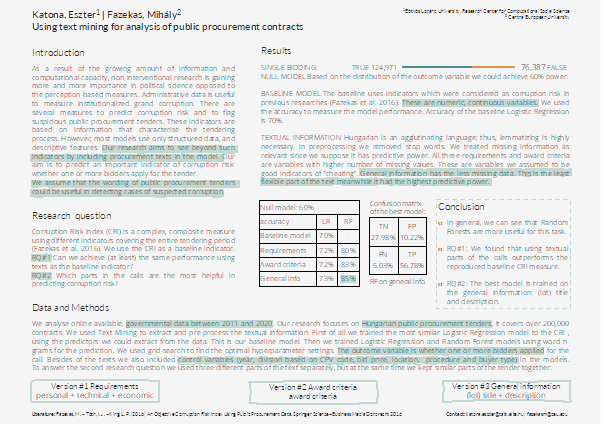
Domonkos Sik, Renáta Németh, Eszter Katona: Topic modelling online depression forums: beyond narratives of self-objectification and self-blaming
2021.09.29. Publication Discursive framing of depression in online health communitiesA publication of our research group has been published by Journal of Mental Health (IF 4.3).
If you don’t have access to T&F, feel free to use one of the 50 free online copies:
https://www.tandfonline.com/eprint/AFFUU26JFMIB7BNXATAZ/full?target=10.1080/09638237.2021.1979493
Eszter Katona, Zoltán Kmetty, Renáta Németh (2021): Applying natural language processing to analyise the representation of corruption in the Hungarian online media
2021.07.19. Publication Corruption in Online Editorial MediaThis paper presents a thematic analysis of the representation of corruption in the Hungarian online media, using a text mining tool called dynamic topic modeling. The text corpus was provided by K-Monitor and includes online articles on corruption and issues related to the misuse of public funds. Our study is exploratory in nature: it is aimed at identifying the main topics of the articles and the dynamics of thematic changes in the period 2007–2018, including the meaning, the background and the changes of each corruption topic. The causal links revealed by this research lie in whether the medium is of an oppositional or of a pro-government position, and how election campaign periods affect the thematic structure of the representation of corruption. Owing to the fact that the ownership of the news portal Origó changed during the analysed period, a natural experiment has also been possible in an attempt to reveal the impact of this change on the thematic structure of the corruption discourse on the portal in question.
Eszter Katona, Árpád Knap, Fanni Máté, Mihály Csótó – Topic modelling of the Információs Társadalom
2021.07.13. PublicationThree members of our research group: Eszter Katona, Árpád Knap and Fanni Máté, with the contribution of Mihály Csótó, wrote an article for the special anniversary issue of the Information Society journal. The primary aim of the study is to review the topics that the journal has included in the Hungarian discourse of “information society studies” over the past 15 years and to explore the thematic structure of the journal with NLP methods. In addition to the content analysis, the article also provides an insight into the co-author network of the journal, as well as the relationship between the authors and each topic.
The paper is accessible on the following URL: https://doi.org/10.22503/inftars.XXI.2021.1.1
The visualizations are available on this link: https://inftars.infonia.hu/inftars20?lang=hu
Fanni Máté (2021): Social Support on an Online Forum for Depression and Anxiety
2021.06.13. Publication Discursive framing of depression in online health communitiesNowadays, online communities are typical sources of social support, which is a considerable help especially for those suffering from depression or anxiety. The aim of my research is to investigate the patterns of social support on an online depression and anxiety forum and to serve as an exploratory research of Natural Language Processing usage to classify comments into the categories of social support. The uniqueness of my research is the quantitative text analysis based on a complete qualitative analysis of the whole dataset. The conclusions of the qualitative analysis provide profound information for model definition, and for their evaluation. This knowledge is important for the investigation the potential of automatic text analysis in sociology. On average, four out of five comments are related to social support on the examined forum. Informational support appears in 59.9 percent of the supportive comments, while emotional support appears in 44.7 percent. The applied models’ accuracies are nearly 80 percent, which means that they classified the vast majority of comments into the right category. The results show that there is a potential in building reliable models in order to classify the comments into the previously defined categories of social support.
Eszter Katona, Renáta Németh (2021): Automated text analytics in corruption research
2021.05.22. Publication Corruption in Online Editorial Media The layers of political public sphere in Hungary (2001–2020)Our former publications in related topics
2021.04.14. Publication Discursive framing of depression in online health communitiesSik Domonkos: From mental disorders to social suffering: Making sense of depression for critical theories. EUROPEAN JOURNAL OF SOCIAL THEORY (2018)
Sik, Domonkos: Válaszok a szenvedésre: A hálózati szolidaritás elmélete. Budapest, Magyarország : ELTE Eötvös Kiadó (2018) , 228 p.
Sik, Domonkos: A szenvedés határállapotai: Egy kritikai hálózatelmélet vázlata. Budapest, Magyarország : ELTE Eötvös Kiadó (2018) , 246 p.
Deckovic-Dukres, V., Hrkal, J., Németh, R., Vitrai, J., Zach, H.: Inequalities in health system responsiveness. Joint World Health Survey Report Based on Data from Selected Central European Countries, 2007. Jelentés a WHO megbízásából.
Remák, E., Gál, R.I., Németh, R.: Health and morbidity in the accession countries. Country report – Hungary. ENEPRI Research Reports 28, Brussels: ENEPRI, 2006.
Albert, F., Dávid, B., Németh, R.: Social support, social cohesion. In.: National Health Interview Survey 2003, Research Report, 2005. (Hung.)
(magyarul: Albert Fruzsina, Dávid Beáta, Németh Renáta: Társas támogatottság, társadalmi kohézió. In.: Országos Lakossági Egészségfelmérés OLEF2003, Kutatási Jelentés, 2005.)
Gábor Csomor – Borbála Simonovits – Renáta Németh (2021): Discrimination at local governments? – Results of an online field experiment
2021.03.20. Publikáció The layers of political public sphere in Hungary (2001–2020)Gábor Csomor, Borbála Simonovits and Renáta Németh published their results in the journal Szociológiai Szemle with the following title: ” Discrimination at local governments? – Results of an online field experiment “.
Sik, Domonkos (2020): From Lay Depression Narratives to Secular Ritual Healing: An Online Ethnography of Mental Health Forums
2020.12.29. Publication Discursive framing of depression in online health communitiesThe article aims at analysing online depression forums enabling lay reinterpretation and criticism of expert biomedical discourses. Firstly, two contrasting interpretations of depression are reconstructed: expert psy-discourses are confronted with the phenomenological descriptions of lay experiences, with a special emphasis on online forums as empirical platforms hosting such debates. After clarifying the general theoretical stakes concerning contested ‘depression narratives’, the results of an online ethnography are introduced: the main topics appearing in online discussions are summarised (analysing how the abstract tensions between lay and expert discourses appear in the actual discussions), along with the idealtypical discursive logics (analysing pragmatic advises, attempts of reframing self-narratives and expressions of unconditional recognition). Finally, based on these analyses an attempt is made to explore the latent functionality of online depression forums by referring to a secular ‘ritual healing’ existing as an unreflected, contingent potential.
Renáta Németh, Domonkos Sik, Fanni Máté. 2020. “Machine learning of concepts hard even for humans: the case of online depression forums”. International Journal of Qualitative Methods
2020.08.25. Publication Discursive framing of depression in online health communitiesSocial scientists of mixed-methods research have traditionally used human annotators to classify texts according to some predefined knowledge. The ‘big data’ revolution, the fast growth of digitized texts in recent years brings new opportunities but also new challenges. In our research project, we aim to examine the potential for natural language processing (NLP) techniques to understand the individual framing of depression in online forums. In this paper, we introduce a part of this project experimenting with NLP classification (supervised machine learning) method, which is capable of classifying large digital corpora according to various discourses on depression. Our question was whether an automated method can be applied to sociological problems outside the scope of hermeneutically more trivial business applications.
The present article introduces our learning path from the difficulties of human annotation to the hermeneutic limitations of algorithmic NLP methods. We faced our first failure when we experienced significant inter-annotator disagreement. In response to the failure, we moved to the strategy of intersubjective hermeneutics (interpretation through consensus). The second failure arose because we expected the machine to effectively learn from the human-annotated sample despite its hermeneutic limitations. The machine learning seemed to work appropriately in predicting bio-medical and psychological framing, but it failed in case of sociological framing. These results show that the sociological discourse about depression is not as well founded as the bio medical and the psychological discourses – a conclusion which requires further empirical study in the future. An increasing part of machine learning solution is based on human annotation of semantic interpretation tasks, and such human-machine interactions will probably define many more applications in the future. Our paper shows the hermeneutic limitations of ‘big data’ text analytics in the social sciences, and highlights the need for a better understanding of the use of annotated textual data and the annotation process itself.
The supplementary material of this article can be found here.
Renáta Németh, Eszter Katona, Zoltán Kmetty (2020): The Perspective of Automated Text Analytics in Social Sciences
2020.04.30. Publication Data Science in Social ResearchIn our paper, we present an overview of Natural Language Processing (NLP) methods, which developed parallel with the spread of ‘Big Data’ paradigm. We present the most promising methods for social sciences, the specific research questions they can answer and the methodological features that distinguish them from classic quantitative methods. These methods go far beyond classic quantitative text analysis based on simple word frequencies. Their modelling logic arises from machine learning methods; hence, it is substantially differing from the classic social science logic that seeks for explanation and casual effects. Our goal is to inspire Hungarian social scientists by providing an insight into a less-institutionalized area, since we believe that at an international level, text mining will be a standard method for empirical social science research within a few years.
Barna, Ildikó, and Árpád Knap. 2020. „A Case Study of Using LDA Topic Modeling in Sociological Research – Antisemitism in Contemporary Hungary”. Presentation, Institute of Formal and Applied Linguistics, Charles University, Prague, Czech Republic.
2020.01.20. Presentation Online AntisemitismIldikó Barna, co-leader of our research group, gave a presentation on contemporary Hungarian antisemitism at the Formal and Applied Linguistics Institute of Charles University Prague. The presentation was based on the Online Antisemitism project conducted with Árpád Knap. In addition to presenting the results of the research so far, in her lecture she also discussed why sociological and domain knowledge is indispensable for interpreting the output of natural language processing.
Further information of the lecture is available on the university’s website. The video recording of the presentation can be accessed on this link.
The post about the presentation can be found here on our website.
Németh, Renáta; Koltai, Júlia (2019): Sociological knowledge discovery through text analytics. In: Rudas, Tamás – Péli, Gábor (eds.) Pathways Between Social Science and Computational Social Science – Therories, Methods and Interpretations. New York, NY, Springer.
2019.12.01. Publication Data Science in Social ResearchIn our work, based on recent research reports, we discuss the advances, challenges and opportunities of Big Data text analytics in sociology. The advances include the utilization of the originally and primarily business and technology-oriented development of information technology, data science, AI and NLP; and also, the rapid growth of computing capacity. These advances provide opportunities. Social behavior can be directly observed, not only on self-reported basis. The observation and analysis could happen in real-time, and – because of the development of NLP methods – the understanding of the content is getting deeper.
As our paper shows, there are new possibilities for sociological research which are in some sense just byproduct of information science. We introduce recently developed methods which can be applied to specific sociological problems outside the scope of business applications. We present sociological topics not yet studied in this area and show new insights the approach can offer to classical sociological questions. As our aim is to encourage sociologists to enter this field, we discuss the new methods on the base of the classic quantitative approach, using its concepts and terminology, addressing also the question of new skills acquired from traditionally trained sociologists.
Barna, Ildikó, and Árpád Knap. 2019. „Magyarországi antiszemitizmus vizsgálata NLP topik modell segítségével”. Presentation, A társadalom kutatásának új útjai, Budapest, ELTE Faculty of Social Sciences, 11 October 2019.
2019.10.11. Presentation Online AntisemitismOn the workshop, Ildikó Barna and Árpád Knap presented the detection of various types of antisemitic narratives in articles and comments, some of which are not measurable by surveys.
Barna, Ildikó, and Árpád Knap. 2019. „New Ways of Scrutinising Overt and Subtle Antisemitism in Hungary”. In 14th ESA Conference – Abstract book: Europe and Beyond: Boundaries, Barriers and Belonging, 880. Manchester, Egyesült Királyság: European Sociological Association
2019.08.21. Presentation Online AntisemitismThe level of antisemitism in Hungary has always been among the highest in Europe. Representative surveys show that approximately 33 to 40 per cent of the Hungarian population is antisemitic. Although there has been some fluctuation, the level of antisemitism has remained quite stable. Moreover, we found, based on representative surveys among Hungarian Jews, that although the proportion of those having experienced or witnessed antisemitic acts one year prior to the survey decreased massively from 79 to 58 per cent between 1999 and 2017, the perception of antisemitism severely deteriorated. While in 1999, 37 per cent of Jews thought that antisemitism was strong or very strong in Hungary, in 2017 65 per cent said the same. This high discrepancy between experience and perception is due to several factors, being one of them the spread of online hatred. This fact makes the analysis of online sources necessary. Due to the vast amount of unstructured online textual data, their examination demands new tools, one of them being Natural Language Processing (NLP). NLP is an interdisciplinary field of research in the intersection of computer science, artificial intelligence, as well as linguistics. In our research, we apply NLP on a massive corpus of recent Hungarian news articles, social media content, and online forum comments. NLP makes possible not only the examination of the structure, the main topics, and actors of overt antisemitism but the identification of underlying subjects and specificities of latent antisemitism. In our paper, we present the first results of our research.
The post about the conference can be found here on our website.
Bio, psycho or social – Discursive framing of depression in online health communities – IC2S2, 5th International Conference on Computational Social Science, Amsterdam, 2019
2019.07.17. Presentation Discursive framing of depression in online health communitiesIn our research we aimed at gathering and automatically classifying online forum posts into the above three framing types by applying different supervised learning algorithms. As our dataset, we decided to use depression-related posts from the most popular English-speaking health forums within the time interval 2016-2018. We obtained only publicly available posts, which are shared willingly by their authors. We used Python to implement our analyses. After pre-processing and feature extraction, the scikit-learn library was used with different algorithms (SVM, Naive Bayes, Logistic Regression and Decision Trees). Our poster can be downloaded here.
Related publications
2019.07.01. Publication Corruption in Online Editorial MediaKostadinova, Tatiana; Kmetty, Zoltán: Corruption and Political Participation in Hungary: Testing Models of Civic Engagement. EAST EUROPEAN POLITICS AND SOCIETIES Online first p. 1 (2019)
Kmetty, Zoltán: Incumbent party support and perceptions of corruption – an experimental study. SZOCIOLÓGIAI SZEMLE 28 : 4 pp. 152-165., 14 p. (2018)
Kmetty, Zoltán: Korrupció percepciója, pártosság, választási részvétel: Hogyan változott a szavazók véleménye a hazai politikai korrupcióról a 2014-2018-as parlamenti ciklus alatt? In: Böcskei, Balázs; Szabó, Andrea (szerk.) Várakozások és valóságok. Parlamenti választás 2018. Budapest, Magyarország : Napvilág Kiadó, MTA TK PTI, (2018) pp. 292-316., 25 p.
Previous publications
2019.07.01. Publication Corruption in Online Editorial MediaEszter Katona’s presentation
Eszter Katona held a presentation entitled ‘Natural Language Processing in Social Sciences’ on 10 May 2019 in Basel, at the Joint Annual Conference of the GPSA Methods of Political Science Section and the SPSA Empirical Methodology Working Group (https://www.methodology-dvpw-
Eszter, Rita Katona ; Renáta, Németh ; Zoltán, Kmetty (2019): Natural Language Processing in Social Sciences. Joint Annual Conference of the GPSA Methods of Political Science Section and the SPSA Empirical Methodology Working Group May 10/11, 2019.
Katona Eszter (2019): Szakdolgozat, 2018, ELTE, Survey Statisztika MSc
Previous publications in epistemology/sociology of science
2019.06.26. Publication Data Science in Social Research- Bárdits, Anna, Németh, Renáta (2017): The rite of statistical significance testing – contemporary critics; the rite in sociology. Szociológiai Szemle, 27:(1) pp. 119-125. (in Hung.)
- Bárdits, Anna, Németh, Renáta, Terplán, Győző (2016): An old problem in the spotlight again. The mistaken practice of the null-hypothesis significance test. (in Hung.) Statistical Review, 94:(1) pp. 52-75.
- Németh, Renáta (2015): Causal inference in empirical sociological research. Szociológiai Szemle, 25(2), pp:2-30. (in Hung.)
- Németh, Renáta (2015): Do numbers really speak for themselves? Replika, Special issue on Big data and Sociology, 92-92, pp: 203-208. (in Hung.)
- Németh, Renáta (2014): Methods of quantitative social research paradigms. socio.hu, 2014/3, pp. 1-16. (Hung.)
Barna, Ildikó, and Árpád Knap. 2019. „Antisemitism in Contemporary Hungary: Exploring Topics of Antisemitism in the Far-Right Media Using Natural Language Processing”. Theo-Web 18 (1): 75–92.
2019.06.15. Publication Online AntisemitismIn this paper, we explore antisemitism in contemporary Hungary. After briefly introducing the different types of antisemitism, we show the results of a quantitative survey carried out in 2017 on a nationally representative sample. Next, we present the research we conducted on the articles related to Jews from the far-right site Kuruc.info. Our corpus contained 2,289 articles from the period between February 28, 2016, and March 20, 2019. To identify latent topics in the text, we employed one of the methods of Natural Language Processing (NLP), namely topic modeling using the LDA method. We extracted fifteen topics. We found that racial antisemitism, unmeasurable by survey research, is overtly present in the discourse of Kuruc.info. Moreover, we identified topics that were connected to other types of antisemitism.
Keywords: antisemitism, Hungary, Natural Language Processing, topic modeling, LDA
Ildikó Barna’s lecture “Overt and Subtle Antisemitism in Hungary” at the “Antisemitism, Anti-Zionism, Israel, and the Holocaust” workshop in Salzburg
2019.02.24. Presentation Online AntisemitismIldiko Barna held a presentation entitled “Overt and Subtle Antisemitism in Hungary” at the “Antisemitism, Anti-Zionism, Israel, and the Holocaust” workshop in Salzburg on 23 February 2019, discussing the methods and challenges of measuring antisemitism. Besides presenting the results of surveys on antisemitism in Hungary, she talked about new research opportunities offered by Natural Language Processing (NLP) methods, and also about the work of the research group.
Németh, Renáta: Data Science and Statistics. Presentation and opening of a debate. Meeting of the Hungarian Society for Clinical Biostatistics, October 19, 2018.
2018.10.19. Presentation Data Science in Social ResearchThe presentation gave an overview of methodological paradigm of “Big Data” and its relation to classic statistics. The debate concerned the problem’s relevance from a biostatistical point of view.
